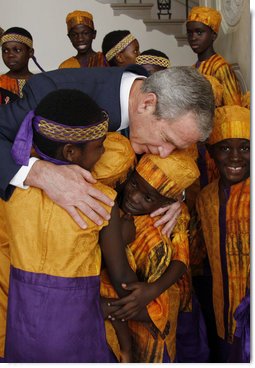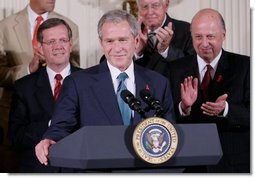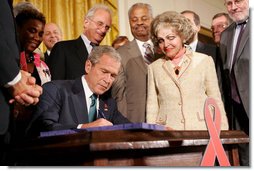
- Afghanistan
- Africa
- Budget Management
- Defense
- Economy
- Education
- Energy
- Environment
- Global Diplomacy
- Health Care
- Homeland Security
- Immigration
- International Trade
- Iraq
- Judicial Nominations
- Middle East
- National Security
- Veterans
|
Home >
News & Policies >
July 2008
|
For Immediate Release
Office of the Press Secretary
July 30, 2008
President Bush Signs H.R. 5501, the Tom Lantos and Henry J. Hyde United States Global Leadership Against HIV/AIDS, Tuberculosis and Malaria Reauthorization Act of 2008
East Room
![]() In Focus: HIV/AIDS
In Focus: HIV/AIDS
![]() In Focus: Health Care
In Focus: Health Care
![]() Fact Sheet: A Historic and Lifesaving Commitment to Fight HIV/AIDS
Fact Sheet: A Historic and Lifesaving Commitment to Fight HIV/AIDS
2:57 P.M. EDT
MRS. BUSH: Welcome, everyone, to the White House. Thank you all very much for coming for this signing of the Tom Lantos and Henry J. Hyde United States Global Leadership Against HIV/AIDS, Tuberculosis and Malaria Reauthorization Act of 2008.
I'm so glad you all are here. Americans can be proud that our country is leading the efforts against global HIV/AIDS. And I'm proud of my husband's leadership in launching the President's Emergency Plan for AIDS Relief. (Applause.)
 In Sub-Saharan Africa, Asia, the Caribbean, and beyond, PEPFAR is saving
lives. I've seen these efforts firsthand in 10 of PEPFAR's 15 focus
countries. Last summer in Zambia, I visited the Mututa Memorial Center.
With support from PEFPAR, Mututa sends caregivers into local homes to nurse
patients with AIDS and AIDS-related illnesses.
In Sub-Saharan Africa, Asia, the Caribbean, and beyond, PEPFAR is saving
lives. I've seen these efforts firsthand in 10 of PEPFAR's 15 focus
countries. Last summer in Zambia, I visited the Mututa Memorial Center.
With support from PEFPAR, Mututa sends caregivers into local homes to nurse
patients with AIDS and AIDS-related illnesses.
One of these patients, an HIV-positive boy named Raphael, was orphaned at the age of three. He was near death when a Mututa caregiver found him and started him on antiretroviral treatment. Now at the age of ten, Raphael told me he was first in his class and he was planning on attending the University of Zambia. His caregiver is still with him, and like a father to him now.
Another Mututa patient, Esnart, was plagued by body sores and recurring bouts of tuberculosis. Her husband abandoned her -- and took all of their household items with him. A caregiver from Mututa encouraged Esnart to be tested for HIV and helped her receive treatment. Esnart was soon strong enough again to start a business to support herself.
Like Raphael and Esnart, millions worldwide face the daily reality of illness and death caused by HIV/AIDS. These men, women, and children have now found new courage knowing this: that those who are orphaned, those who are sick, those who have been abandoned will always have a friend in the people of the United States.
That is the commitment that PEPFAR has made -- and it's a commitment that we reaffirm today.
Now, the man who began this work of compassion more than five years ago: my husband, President George W. Bush. (Applause.)
THE PRESIDENT: Thank you. Thank you for the kind introduction. (Laughter.) And welcome to the White House for what has got to be an historic and joyous day.
I am about to sign the United States Global Leadership Against HIV/AIDS, Tuberculosis and Malaria Reauthorization Act of 2008, and I'm looking forward to it. (Laughter.) This Act is -- it's going to save millions of people, and it's -- honors the memory of two great leaders: Tom Lantos and Henry Hyde. And we're proud members of their families are here. And I'm looking forward to you all joining us when we sign the bill.
This bill embodies the extraordinary compassion of the American people. We are a compassionate nation. And that's what this bill says loud and clear. I want to thank everybody who's helped make this bill possible.
 I particularly want to thank the members of the House and the Senate who
have joined us. I know you're anxious to see the bill signed so I'm not
going to try to name every single name. But I do want to thank Joe Biden
and Dick Lugar from the United States Senate. These men worked together in
an incredibly constructive way to get the bill moving, and I want to thank
you.
I particularly want to thank the members of the House and the Senate who
have joined us. I know you're anxious to see the bill signed so I'm not
going to try to name every single name. But I do want to thank Joe Biden
and Dick Lugar from the United States Senate. These men worked together in
an incredibly constructive way to get the bill moving, and I want to thank
you.
Howard Berman, Chairman of the House Foreign Affairs Committee, worked very hard to get this bill going as well. And all the other members, thank you for coming. Proud you all are here.
I want to thank Mike Leavitt; John Negroponte; Henrietta Fore; Mark Dybul, who happens to be the U.S. Global AIDS Coordinator. He's done such a fine job he ended up on the stage for the bill signing ceremony. (Applause.)
And the bald-headed guy on the end -- (laughter) -- not you, Biden, but -- (laughter) -- Rear Admiral Tim Ziemer, who is the U.S. Malaria Coordinator. Thank you for coming. (Applause.)
Peter Piot, UNAIDS Executive Director; appreciate you coming, Peter. Rajat Gupta is the Chairman of the Board of the Global Fund. Glad you're here, Rajat, thank you both for coming. Members of the diplomatic corps, we've proud to have you here. Congressional and agency staff who worked so hard on this bill, thank you for doing it.
African Children's Choir, which we'll hear soon -- I think you'll find them to be as angelic as I did. I want to thank all the supporters of PEPFAR. Thank you for your diligence and your care and your hard work.
Just a few years ago, HIV/AIDS raged out of control. An entire continent was caught in the pandemic's merciless grip. In countries like Botswana, AIDS had cut the average life expectancy by 15 years. One newspaper wrote: "The AIDS pandemic is destined to rival the Black Death of the Middle Ages - as a global horror."
Well, today the outlook is really different. HIV/AIDS is still one of the world's greatest humanitarian challenges, no question about it, but it is a challenge we're meeting. And a lot of it has to do with PEPFAR.
PEPFAR is the largest commitment by any nation to combat a single disease in human history. (Applause.) It is distinguished from past relief efforts by a few key principles. The Emergency Plan demands specific, measurable targets for progress. It puts local partners in the lead, because they know the needs of their people best. It enlists new partners from the faith community and the private sector.
 And so far the results are striking. When we launched the initiative in
2003, only 50,000 people in Sub-Sahara Africa were receiving antiretroviral
treatments. Today we support treatment for nearly 1.7 million people in
the region -- and tens of thousands more around the world, from Asia to
Eastern Europe. PEPFAR has also supported care for nearly 7 million
people, including millions of orphans and vulnerable children. To date,
PEPFAR has allowed nearly 200,000 children in Africa to be born HIV free.
And so far the results are striking. When we launched the initiative in
2003, only 50,000 people in Sub-Sahara Africa were receiving antiretroviral
treatments. Today we support treatment for nearly 1.7 million people in
the region -- and tens of thousands more around the world, from Asia to
Eastern Europe. PEPFAR has also supported care for nearly 7 million
people, including millions of orphans and vulnerable children. To date,
PEPFAR has allowed nearly 200,000 children in Africa to be born HIV free.
We're also making great strides in the area of prevention, thanks to our embrace of the principles of ABC: Abstinence, Be faithful, and use Condoms. Guided by this philosophy, people are changing their behavior -- and as they do, they're helping to turn the tide against HIV in their countries.
These statistics are promising. Yet there is no way to quantify PEPFAR's greatest achievement: the spread of hope. Spreading hope is in our nation's security interests, because the only way our enemies can recruit people to their dark ideology is to exploit despair. And spreading hope is in our moral interests -- because we believe that to whom much is given, much is required.
Laura and I saw the hope on our trip to Africa. I wish every single America [sic] could have seen the tens of thousands of people who lined the streets during our visit, and they were cheering and waving American flags in gratitude to the generosity of the American people. It's important for our fellow citizens to understand that PEPFAR is saving lives, that PEPFAR is showing the good heart of our nation, that PEPFAR earns us respect and thanks around the world.
We must remain vigilant in the fight against HIV/AIDS. As President Kikwete of Tanzania told me, he said -- and told the people of his country: "If this program is discontinued or disrupted, there would be so many people who lose hope. My passionate appeal is for PEPFAR to continue."
Well, happily, the United States Congress heard this appeal. With this bill, America will continue PEPFAR for another five years. This legislation will dramatically increase our financial commitment to the fight against HIV/AIDS and other diseases. It will preserve the principles that have made PEPFAR a success. It will help us build on PEPFAR's strengths:
The bill maintains our insistence on results -- and allows us to set new and clear goals. With this funding, we will support treatment for at least 3 million people. We will prevent 12 million new HIV infections worldwide. We will support care for 12 million people affected by HIV/AIDS, including 5 million orphans and vulnerable children.
This bill demonstrates our sustained commitment to strong bilateral partnerships. Under PEPFAR, leaders of our host countries come up with a strategy, a strategy aimed at -- that -- of defeating HIV with a program that works. They pledge to carry out the strategy with honesty. They agree to strong accountability measures, and once they do the United States provides the money, the technology and the expertise to make the strategy a success.
The bill will help bolster multilateral efforts to combat the disease -- and make sure America's contributions are used even more effectively. Today the United States is the largest contributor to the Global Fund to Fight AIDS and Tuberculosis and Malaria. The bill maintains our commitment to this program. It will bring greater transparency and accountability to the Fund's vital work. The bill also demonstrates that the United States is keeping its promises to fight HIV/AIDS. Today America calls on other nations, particularly the G8, to honor the commitments they have made as well. (Applause.)
The bill will expand the health care systems PEPFAR has put in place. Since PEPFAR began, we've helped build clinics and train health care workers in Africa and beyond. With this bill, we're committing to train at least 140,000 new health care workers to provide HIV prevention and treatment and care. The men and women will continue to help Africa curb HIV epidemics -- along with many other health care challenges that face -- that the continent faces.
This bill will help us combat the diseases that complicate HIV/AIDS. It commits $4 billion to fight tuberculosis -- which is the leading killer of Africans living with HIV. The bill also pledges an additional $5 billion to our Malaria Initiative. Through this Initiative, we've provided malaria treatment and prevention services to more than 25 million people. We've dramatically reduced malaria in many parts of Africa. The additional funds in this bill will help us save even more lives.
This bill will help us reduce HIV's deadly stigma -- which is one of the greatest obstacles to defeating the epidemic. As more people get treatment, we will show the world that it is possible for people to live positively with HIV while making important contributions to their communities. Through this bill, the United States will also partner with governments around the world to ensure that reducing the stigma of HIV becomes a vital part of their countries' efforts to combat the pandemic.
With this legislation, America is showing its tremendous regard for the dignity and worth of every human being. This afternoon, I want to speak directly to those around the world who have, or think they may have, HIV: A positive diagnosis does not have to be a reason for shame. So don't let shame keep you from getting tested or treated. Your life is treasured by the people who love you. It is precious in the eyes of God. It matters to the people of the United States. (Applause.)
Defeating HIV/AIDS once and for all will require an unprecedented investment over generations. But it is an investment that yields the best possible return: saved lives. One of these lives belongs to Agnes Nyamayarwo. Agnes lost her husband and son to AIDS, and is HIV positive herself. Yet with the support from PEPFAR, Agnes has turned her grief into action. She has traveled the world educating others about this disease. I want to thank you for coming, Agnes. Thank you for coming all the way from Uganda. (Applause.)
Mohamad Kalyesubula is with us -- not yet, Mohamad. (Laughter.) Hold your applause. (Laughter.) Stay right there. (Laughter.) By the time Mohamad was diagnosed, he had been bed-ridden for an entire year with HIV/AIDS. His immune system was almost wiped out. Yet antiretroviral treatment he received at a clinic supported by PEPFAR has helped his health improve. He now supports six children with money he earns at the clinic caring for others with HIV. I met him my first trip to Africa shortly after his diagnosis. He told me he had a dream, which was to come to the White House. (Laughter.) Here you are, brother. Welcome. (Applause.)
Agnes and Mohamad are proof of what many in Africa call the Lazarus effect: Communities once given up for dead are brought back to life. Today we pray that God will comfort those who suffer and mourn. We pray that he will guide those who carry out this initiative's life-saving work. And we ask for his blessings on each of you here today, and the United States of America.
And now it is my pleasure to sign the United States Global Leadership Against HIV/AIDS, Tuberculosis and Malaria Reauthorization Act of 2008, and I do so in the memory of Henry Hyde and Tom Lantos. (Applause.)
END 3:13 P.M. EDT


